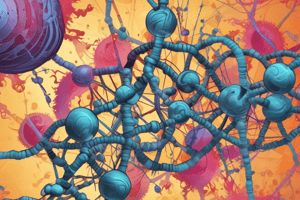Podcast
Questions and Answers
Which of the following is true about viruses?
Which of the following is true about viruses?
- Viruses contain both DNA and RNA
- Viruses are composed of a protein coat called capsid (correct)
- Viruses have organelles and ribosomes
- Viruses can replicate without taking control of host cells' synthetic machinery
What is the role of the genetic material in a virus?
What is the role of the genetic material in a virus?
- To provide energy for the virus
- To carry out transcription of the (-) strand into the (+) strand
- To replicate the virus (correct)
- To immediately be translated by the host's ribosomes into protein
Which type of RNA virus can be immediately translated by the host's ribosomes into protein?
Which type of RNA virus can be immediately translated by the host's ribosomes into protein?
- RNA of retroviruses
- (+) stranded RNA virus (correct)
- (-) stranded RNA virus
- Looped RNA virus
What is the role of the enzyme RNA dependent RNA polymerase in a (-) stranded RNA virus?
What is the role of the enzyme RNA dependent RNA polymerase in a (-) stranded RNA virus?
What is the process that converts (+) RNA into protein?
What is the process that converts (+) RNA into protein?
Flashcards are hidden until you start studying
Study Notes
Key Facts about Viruses
- Viruses are basic life forms composed of a protein coat called capsid.
- They do not have organelles or ribosomes.
- The genetic material of viruses can be either DNA or RNA.
- Viruses replicate by taking control of the host cell's synthetic machinery.
- Viruses contain genetic information but not the enzyme needed for replication.
- Viral morphology is determined by the structure of the nucleic acid.
- RNA viruses can have different types of RNA, such as (+) stranded, (-) stranded, or retroviral RNA.
- (+) stranded RNA can be immediately translated by the host's ribosomes into protein.
- (-) stranded RNA needs to be transcribed into a (+) strand before translation can occur.
- (-) RNA viruses carry a capsid with an enzyme called RNA dependent RNA polymerase, which transcribes the (-) strand into a (+) strand.
- Translation is the process of converting the RNA into protein.
- The (+) RNA is translated by the host's ribosomes to synthesize proteins.
Studying That Suits You
Use AI to generate personalized quizzes and flashcards to suit your learning preferences.




